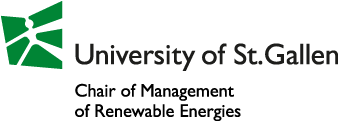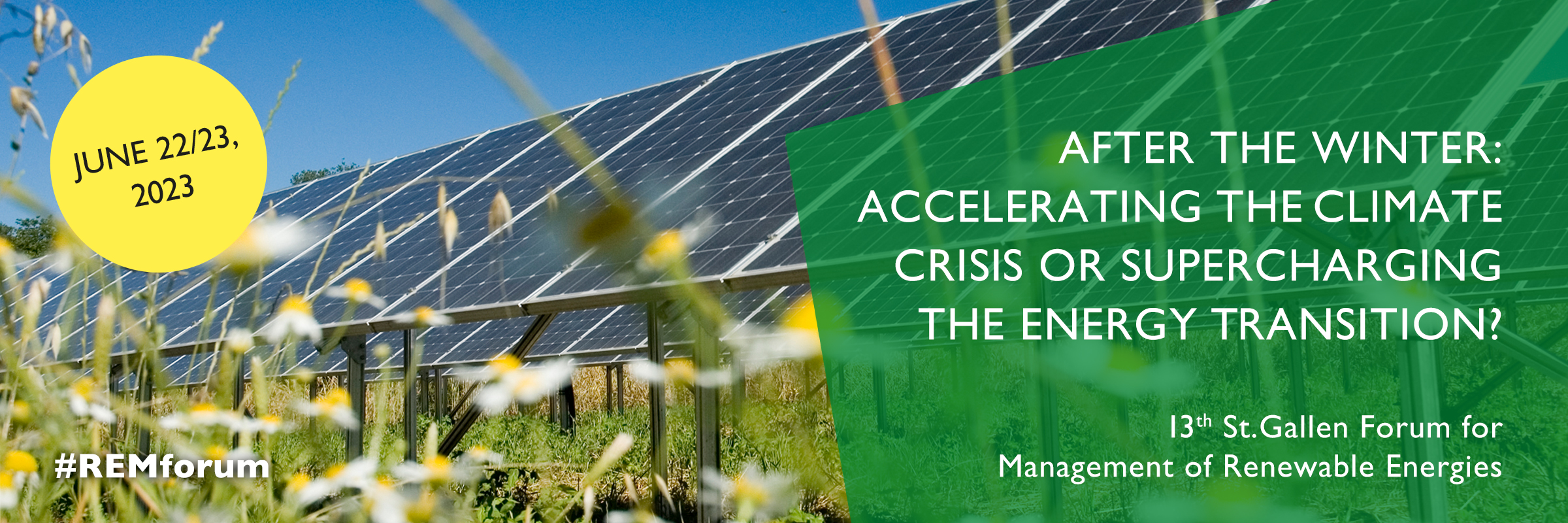Pre-Conference Session
Swiss Energy Strategy 2050 and EU Clean Energy Package: Stronger Together?
- Beatrice Petrovich & Dr. Philipp Thaler, University of St.Gallen (workshop leaders)
- Jean-Christophe Füeg, Swiss Federal Office of Energy, Head of International Affairs, CH
- Dr. Oliver Koch, Deputy Head of Unit, DG Energy, European Commission
- Imke Lübbeke, Head of Unit, EU Climate and Energy Policy, WWF European Policy Office, BE
- Eberhard Röhm-Malcotti, Head of EU Energy Policy, Axpo Group, BE/CH
- Dr. Jörg Spicker, Senior Strategic Advisor, Swissgrid AG
Governing the energy transition and attracting investments in clean energy poses similar challenges everywhere. However, the details of energy transition strategies are rarely coordinated across borders. Switzerland and the European Union are an interesting case in point: in the absence of an institutional agreement governing EU-Swiss energy relations, Brussels and Berne have been developing their strategies and targets for the energy transition in parallel. As a consequence, similar objectives are often pursued with different instruments, for instance in terms of financial support for renewables and electricity market liberalization. How can the consistency between the Swiss Energy Strategy 2050 and the EU Clean Energy Package be improved? Could further integration of these strategies help to attract investment flows necessary for the European energy transition? Could grid interconnection substitute a lack of political integration? And are bottom-up approaches an alternative to national and supranational agreements? This workshop, through expert inputs, interactive discussion and participation of diverse stakeholders from both Switzerland and the EU, gives participants the opportunity to share their views on the governance of the energy transition, enrich their understanding of EU-Swiss energy relations, and jointly explore avenues for collaboration.
Workshop 1
Digital B2B & B2G prosumer business models
- Prof. Dr. Moritz Loock, University of St.Gallen (workshop leader)
- Heidi Tuiskula, Senior Researcher and International Project Manager, Smart Innovation Norway
This workshop looks into how digital technology enables novel business models for B2B prosumers (e.g. for small- and medium-sized companies) and B2G prosumers (e.g. universities and public buildings). B2B and B2G prosumers can utilize hardware, data and software to integrate electric mobility and renewables, and to optimize their electricity consumption. Within the workshop different pilot applications from the E-Land project will be presented to outline the potential for digital prosumer business models. Based on this input workshop participants are encouraged to discuss opportunities and challenges that are important for implementing digital B2B and B2G prosumer business models into current and future energy markets.
Workshop 2
Winning Hearts and Minds through Community Energy (in German)
- Alexander Stauch & Pascal Vuichard, University of St.Gallen (workshop leaders)
- Melanie Mettler, Founder, Sunraising
- Daniel Moos, Head regional energy office & Head energy projects, City of Frauenfeld
- Marian Schreier, Mayor, City of Tengen
Many European countries (including Switzerland and Germany) are on their way to transform their energy systems. However, in times of political polarisation and increased policy risk, many project developers are confronted with opposition to energy infrastructure projects at the local level. In an attempt to preventively address the concerns put forward by vocal opponents, community integration and community-based marketing activities become crucial aspects for a successful project implementation. This workshop provides new insights on opportunities and challenges of community-based energy projects, using best-practice cases and latest insights from research. Participants of this workshop will learn how to coordinate and implement community energy projects and discuss approaches how to “win the hearts and minds” of the local population. Moreover, by engaging in an interactive case study on community energy, participants will apply their new knowledge directly.
Workshop 3
Touchpoints for e-mobility
- Dr. Karoline Gamma & Jana Plananska, University of St.Gallen (workshop leaders)
- Julia Grentz, Product Manager Volkswagen at AMAG, resp. ID NEO
- Robin Schmid, e-mobility Blogger, Founder Robin TV
The Roadmap of the Swiss Government to support e-mobility pursues the ambitious goal of 15% of vehicle purchases in 2022 being electric. In this workshop, we will discuss how policy makers and industry can nudge customers to reach this goal. Among others, the workshop will aim to answer: What keeps consumers from making the switch? What are the important “touchpoints” influencing the final purchase decision - information campaigns, car dealers, family and friends, or something else? And, finally, where in the purchasing process do consumers relapse to conventional car technology and how can these challenges be overcome? A specific focus will be put on the role of new and old players in the industry and their efforts on leveraging touchpoints for e-mobility in marketing strategies.
Workshop 4
Myth or Reality? Tackling Rumors on Wind Energy
- Nathalie Dällenbach, Nina Schneider & Julia Cousse, University of St.Gallen (workshop leaders)
- Cédric Aubert, Member Executive Board, ewz & Chairman Board of Directors, Energie Naturelle Mollendruz SA
- Cyril Ducatez, Research Analyst, ewz
- Prof. Geraint Ellis, PhD, School of Natural and Built Environment, Queen's University, Belfast
A variety of views on energy and environmental issues are circulating in the public sphere, and not all of them can be backed up by scientific knowledge. The rise of social media has exacerbated the challenges for veracity in mass communication. Some observers even assert that we are entering a ‘post-truth’ world, in which science is devalued and personal “truths” are based on “alternative facts”. The implementation of wind energy projects is not spared from this development. Local citizens find it increasingly difficult to distinguish trustworthy information from circulating rumors. In this workshop, we will first discuss misinformation and disinformation from a theoretical perspective to get a better understanding of their drivers (e.g. emotions). In a second step, we aim to look at their role in the specific context of wind energy. Finally, workshop participants will discuss promising ways to address false beliefs. This will help to develop fruitful communication strategies for wind energy projects that facilitate informed democratic decisions.
Workshop 5
Rolling Solar Storage: the Convergence of RE & EV
- Dr. Merla Kubli, University of St.Gallen & ZHAW Winterthur (workshop leader)
- Dr. Andreas Beer, Expert Product Research and Engineering, RePower AG
- Alain Brenzikofer, Head Dept. Decentralized Systems, Supercomputing Systems AG
- Lisa Oberzaucher, University of St.Gallen
The future of mobility is electric. Smoothly integrating electric mobility into the grid without compromising security of electricity supply is a key challenge in decarbonizing the energy and transport systems. Charging a large number of electric vehicles (EVs) in an uncoordinated manner could turn out to be a stress test for distribution grids and require costly grid reinforcements. In contrast, dynamic and bi-directional charging of EVs in a grid-friendly mode could facilitate the integration of both electric mobility and renewables. This workshop will bring together three key perspectives on grid integration of EV and RE: the grid operator perspective, the customers’ willingness to adjust their charging profile, and the perspective of ICT experts developing dynamic charging management systems. In an interactive, model-based workshop, participants will discuss opportunities and challenges of successful grid integration.

